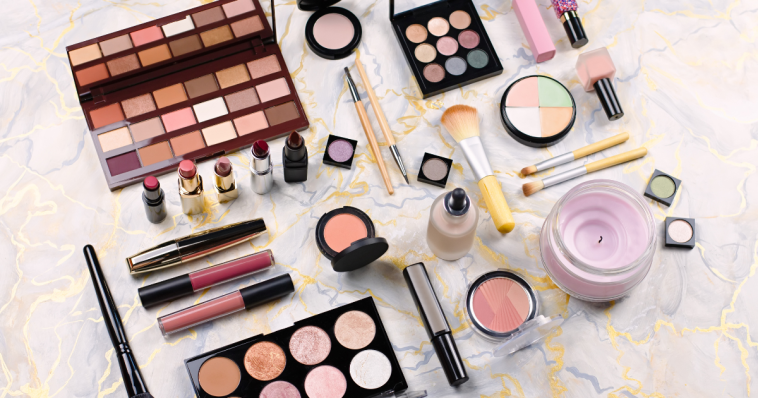Do you need help finding the right makeup tips for your skin type? You’re not alone! This guide is here to help you discover personalized techniques and product recommendations, whether your skin is dry, oily, combination, or sensitive. We’ve got everything you need, no matter your concerns.
Your skin type is determined by genetics. Still, it can change over time due to internal factors like diet, hormones, and overall health. What you eat, how your body responds to stress, and aging can all influence your skin’s appearance. Externally, weather, pollution, and the skincare products you use also play a significant role. Harsh winter air can worsen dry skin, while humid climates lead to oilier skin. Understanding these factors can help you tailor your routine to keep your skin looking and feeling its best.
Makeup Tips for Different Skin Types: A Friendly Guide
Applying makeup that suits your skin type is essential for a flawless look. Choosing the right products can transform your skin, whether easy, dry, combination, or sensitive. This guide provides tailored tips for every skin type, ensuring a beautiful, long-lasting finish.
1. Oily Skin
If you have oily skin, sebum production increases, creating a shiny appearance. Here’s how to manage it:
- Exfoliate Gently: Use a mild exfoliator two to three times a week to remove dead skin cells without stripping away essential oils.
- Hydrate with Care: Opt for light moisturizers with hyaluronic acid. This keeps your skin hydrated without making it oily.
- Prime Properly: Use a primer to create a smooth base for your makeup. Let it dry before applying the foundation.
- Choose the Right Foundation: Opt for a long-wear or matte foundation and finish with a translucent powder to keep the shine in check.
- Extra Tips:
- Use a gentle, non-drying cleanser.
- Apply oil-free and mattifying products.
- Use a brush with synthetic bristles for foundation.
- Use powdered blush and highlighter.
- Apply setting powder to your T-zone to control shine.
- Use a setting spray to keep your makeup fresh and intact all day.
- Use blotting papers: Remember to bring blotting papers with you to absorb extra oil throughout the day.
- Choose oil-free makeup: Opt for products specifically labeled “oil-free” to avoid clogging pores.
- Consider clay masks: Use a clay mask once or twice a week to soak up extra oil and keep your skin balanced and fresh.
2. Normal Skin
With normal skin, you have the flexibility to explore different makeup products and techniques to highlight your natural beauty:
- Foundation Freedom: Use any formula that appeals to you, from tinted moisturizers to full-coverage foundations.
- Blend Well: Use a brush or beauty sponge to blend your foundation for a flawless finish.
- Set Your Makeup: Use a setting spray or a translucent setting powder to complete a dewy look.
- Extra Tips:
- Use a primer to extend makeup wear time.
- Match your foundation to your skin tone.
- Always apply sunscreen.
- Remove makeup thoroughly to avoid breakouts.
- Keep your makeup brushes and sponges in good condition by cleaning them regularly and ensuring a flawless application.
- Exfoliate once a week for radiant skin.
- Try different looks to keep your routine exciting.
3. Dry Skin
Dry skin needs extra hydration to look its best:
- Cleanse and Exfoliate: Use a gentle cleanser daily and exfoliate once a week.
- Hydrate: Use hydrating and brightening skincare products. Moisturize daily and nightly.
- Choose Creamy Products: Opt for liquid foundations and cream concealers and avoid matte finishes.
- Extra Tips:
- Use a hydrating cleanser.
- Apply a hydrating serum or facial oil.
- Choose rich moisturizers.
- Use a creamy, hydrating primer.
- Apply foundation with a damp beauty sponge for a smooth and even finish.
- Use cream or liquid blush and highlighter.
- Keep a facial mist handy for a quick refresh.
4. Combination Skin
Combination skin requires a mix of tips for both oily and dry areas:
- Cleanse Carefully: Use a mild cream or gel cleanser that hydrates and calms the skin.
- Target Treatments: Use mattifying products on your T-zone and hydrating ones in dry areas.
- Primer and Foundation: Use a mattifying primer on your T-zone. Choose a medium-coverage foundation and apply it with different tools for different areas.
- Extra Tips:
- Apply a translucent setting powder to keep the shine under control.
- Choose blush, highlighter, and bronzer based on your skin type.
- Use cream formulas for dry areas and powder for oily areas.
5. Sensitive Skin
Sensitive skin needs gentle and hypoallergenic products:
- Cleanse Gently: Use a gentle, fragrance-free cleanser.
- Moisturize Lightly: Apply a lightweight, non-comedogenic moisturizer.
- Choose Carefully: Look for foundation formulas for sensitive skin, avoiding anything with fragrances or harsh chemicals.
- Extra Tips:
- Use mineral-based or physical sunscreen.
- Cooling facial mist or toner to refresh and hydrate your skin.
- Avoid exfoliating beads and scrubs.
- Stick to one brand to avoid ingredient conflicts.
- Look for “fragrance-free,” “hypoallergenic,” or “non-comedogenic” labels.
- Apply makeup with light pressure and avoid fingers.
- Throw away expired makeup to avoid irritation.
With these tailored tips, you can enhance your natural beauty and achieve a flawless finish, regardless of skin type. Experiment, find what works best for you, and enjoy your makeup routine! Understanding your skin type and how it can change is the first step towards achieving a healthy, glowing complexion.
Understanding the factors affecting your skin helps you adjust your skincare routine to suit its changing needs better. Whether you have naturally oily skin that sometimes feels dry in certain areas or generally dry skin that occasionally becomes irritated, being mindful of these influences will help you maintain balanced and beautiful skin.
Evaluating Skin Type and Condition
Unlike skin type, which is mainly genetic, skin conditions can change significantly throughout your life. Several internal and external factors contribute to your skin’s condition, including climate, pollution, medications, stress, hereditary factors influencing sebum, sweat, natural moisturizing levels, and the skincare products you use and your overall skincare routine.
Choosing skincare products that match your skin type and address specific needs is crucial. Dermatologists and skincare experts evaluate skin conditions by assessing various factors:
1. Signs of Aging
Anti-aging products can help minimize wrinkles. Ingredients like B-Resorcinol, found in Eucerin‘s EVEN BRIGHTER range, effectively reduce dark spots. Our skin type can evolve—oily teenage skin might become drier later, and normal skin can dry as we age. As we age, our skin loses volume and density, leading to fine lines, wrinkles, and changes in pigmentation. Understanding these signs helps determine skin condition.
2. Skin Color
Skin color and ethnicity affect how our skin responds to external factors such as sun exposure, pigmentation disorders, irritation, and inflammation. Primary skin color is influenced by the epidermis’s density and melanin distribution. Skin redness can also indicate circulation success and help identify conditions like couperose and rosacea.
3. Natural Moisturizing Factors (NMFs)
Healthy skin naturally produces Natural Moisturizing Factors (NMFs), such as amino acids, to help bind water into the skin. These NMFs are crucial in maintaining the skin’s elasticity and suppleness, preventing dehydration, and ensuring the skin remains soft and resilient. When the skin’s protective barrier is intact, it can effectively retain these essential NMFs, which keeps the skin well-moisturized and healthy.
However, when this barrier is compromised—due to environmental damage, harsh skincare products, or underlying skin conditions—the skin loses its ability to retain NMFs. This leads to decreased skin moisture, resulting in dryness, flakiness, and an overall decline in skin condition. Keeping a healthy skin barrier is crucial for preserving NMFs and keeping the skin hydrated and in optimal condition.
4. Skin Sensitivity
Sensitive skin is easily irritated by factors generally well-tolerated by balanced skin, such as skin care products or temperature changes. Sensitivity can be a permanent condition for some or triggered by specific internal and external factors for others. It occurs when the skin’s natural barrier is compromised, leading to water loss and irritant penetration. Factors like sun exposure and certain ingredients in cosmetics and cleansers can exacerbate symptoms.
Skin sensitivity occurs when the skin’s natural barrier is compromised, making it more easily irritated by factors that generally don’t affect balanced skin, such as skin care products or temperature changes. Various internal and external factors can trigger this heightened reactivity, leading to redness, rashes, stinging, itching, and burning sensations.
It’s important to use skincare products specifically formulated for sensitive skin to manage sensitive skin and avoid potential irritants. Understanding and addressing sensitive skin’s unique needs can help minimize irritation and maintain a healthy, comfortable complexion.
Embrace Your Skin Type for Flawless, Long-Lasting Makeup
Achieving flawless makeup begins with understanding your unique skin type, whether oily, dry, combination, or sensitive. Tailoring your makeup and skincare routine to your skin’s needs can enhance your natural beauty and ensure your makeup stays fresh all day. It’s essential to focus not only on the makeup you use but also on proper skincare.
Feel free to experiment with different products and techniques to discover what best suits you, keeping in mind that your skin type may change over time. Adapt your routine accordingly, whether you’re addressing seasonal shifts, hormonal changes, or daily skin balance challenges. You can maintain a healthy, glowing complexion by embracing your skin type and adjusting your makeup routine accordingly.



